Key takeaways:
- Organic wine production emphasizes sustainability and biodiversity, resulting in authentic flavor profiles that reflect the terroir.
- Organic wines typically have lower sulfite levels, making them a better choice for those sensitive to sulfites.
- Mindful consumption enhances the wine experience, focusing on savoring aromas and flavors while enjoying the company of others.
- Selecting quality organic wines involves looking for certifications, understanding terroir, and considering tasting notes and reviews.
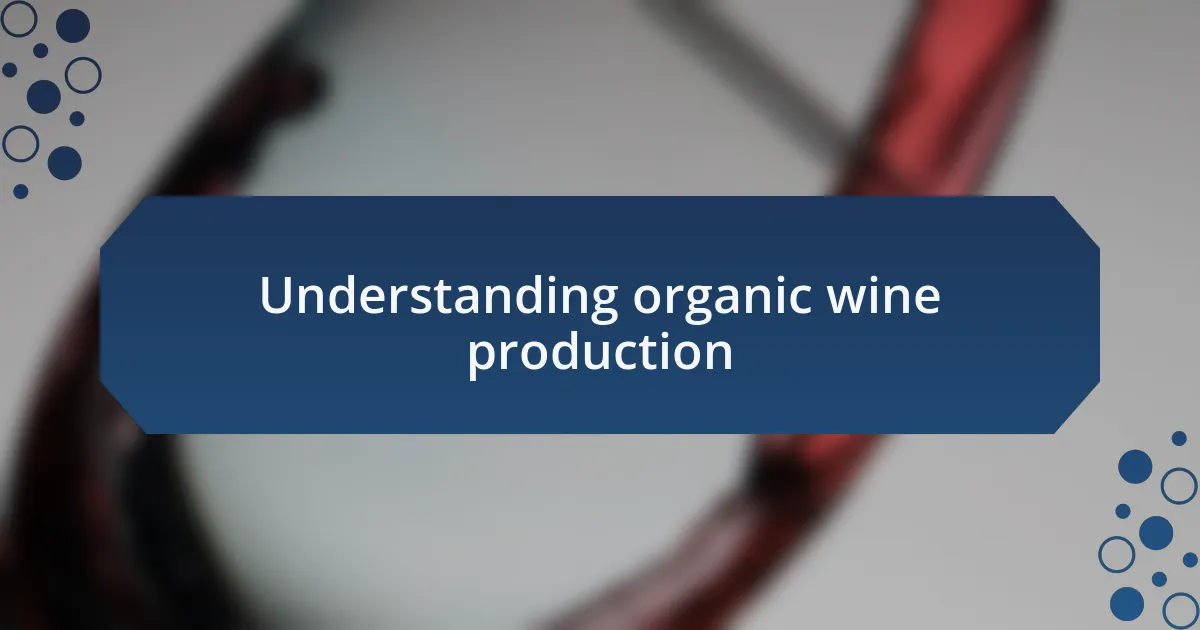
Understanding organic wine production
When I first delved into organic wine production, I was struck by how different it feels compared to conventional methods. Organic vineyards flourish without synthetic pesticides and fertilizers, allowing the grapes to express their true nature. This practice isn’t just about the grapes; it’s about nurturing the soil and the ecosystem, which ultimately brings us a more authentic product.
Have you ever noticed how organic wines often have a certain depth? I’ve experienced this firsthand at tastings where organic varietals stood out, showcasing unique flavor profiles that I hadn’t encountered before. This is a result of the careful cultivation methods, which prioritize biodiversity and respect for the land, allowing for a more honest expression of the terroir—essentially, the environment in which the grapes are grown.
Exploring organic wine production also means understanding the commitment to sustainability. For me, it’s heartening to know that choosing organic doesn’t just benefit our health; it also supports farmers who are dedicated to protecting their land for future generations. Isn’t it rewarding to think that every sip contributes to a larger movement toward environmental stewardship?
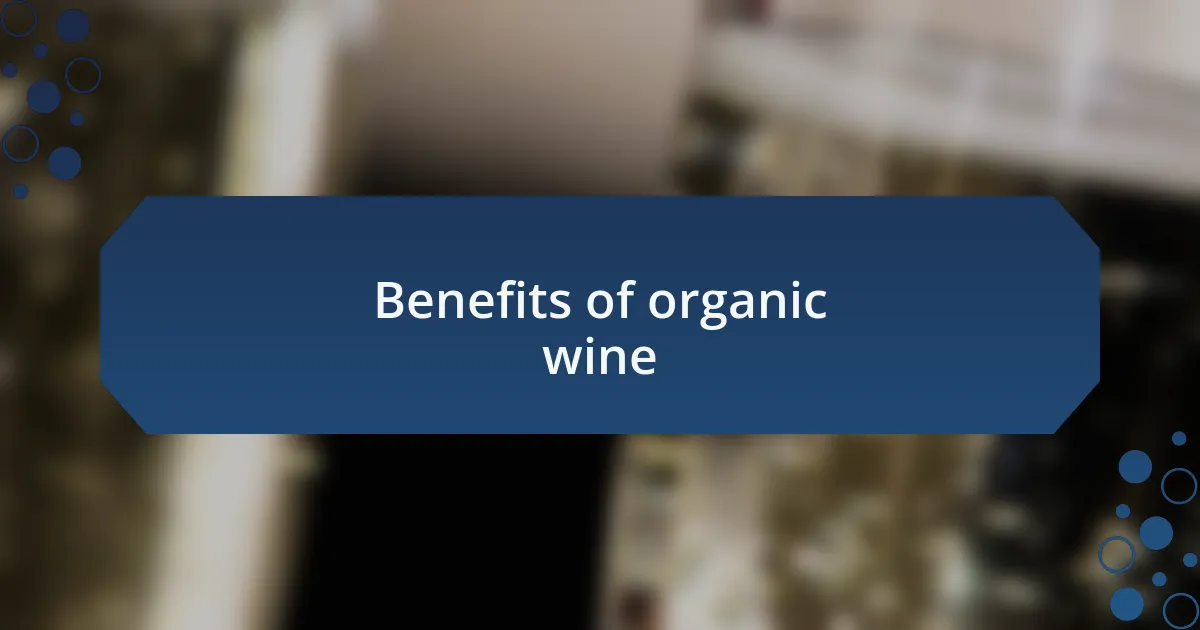
Benefits of organic wine
Organic wine offers numerous benefits that extend beyond just taste. One striking advantage I’ve noticed is the lower levels of sulfites in these wines. For people like me who often experience sensitivity to sulfites, organic options provide a much more pleasant drinking experience. This can lead to fewer headaches and less discomfort, allowing for the enjoyment of wine without the usual post-sipping regrets.
Additionally, supporting organic winemakers means we’re investing in practices that promote soil health and biodiversity. I vividly remember attending an organic vineyard tour where the whole ecosystem seemed vibrant and alive. The grapevines were surrounded by wildflowers and beneficial insects—proof that these wines are crafted with care for the environment. Isn’t it uplifting to think that your wine choice can help preserve such beautiful ecosystems?
Finally, organic wines often reflect the terroir in a more profound way. I recall tasting an organic Pinot Noir that was unlike any other; its rich, earthy notes clearly told the story of the land it came from. This connection to the environment not only enhances the wine’s flavors but also deepens our appreciation of where it comes from—how can you not feel a bit more connected with each sip?
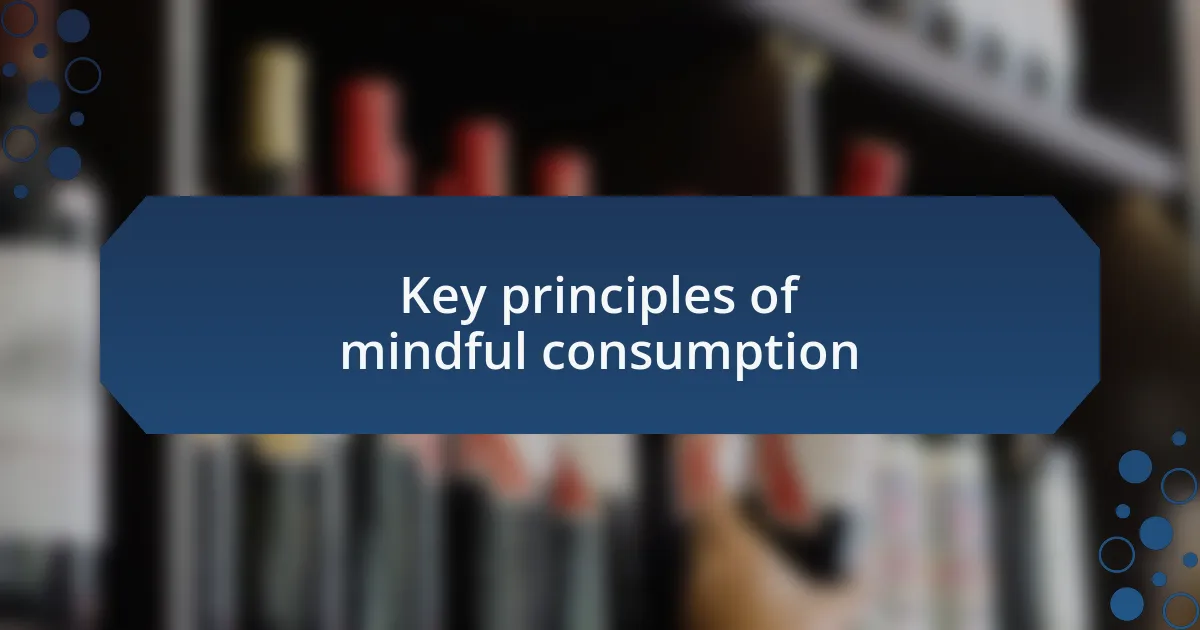
Key principles of mindful consumption
When it comes to mindful consumption, one key principle is to savor each sip. I’ve found that taking a moment to breathe in the aromas before tasting can truly transform the experience. Have you noticed how different scents can evoke memories? The smell of a fruity organic wine can remind me of summer picnics from my childhood, adding a personal touch to the enjoyment of wine.
Another vital aspect is to pay attention to the context in which you drink. I’ve often enjoyed a glass of organic wine while surrounded by friends at a cozy gathering. This shared experience enhances my appreciation, making each sip feel like a celebration of connection. What better way to elevate the enjoyment of organic wine than by creating memories with loved ones?
Lastly, moderate consumption is essential. I remember a night when I indulged a little too freely at a wine tasting event. While it was fun, I found that being mindful of my limits allows me to relish the flavors without overindulgence. After all, the joy of organic wine lies not just in the wine itself, but in being able to enjoy it fully for a long time to come.
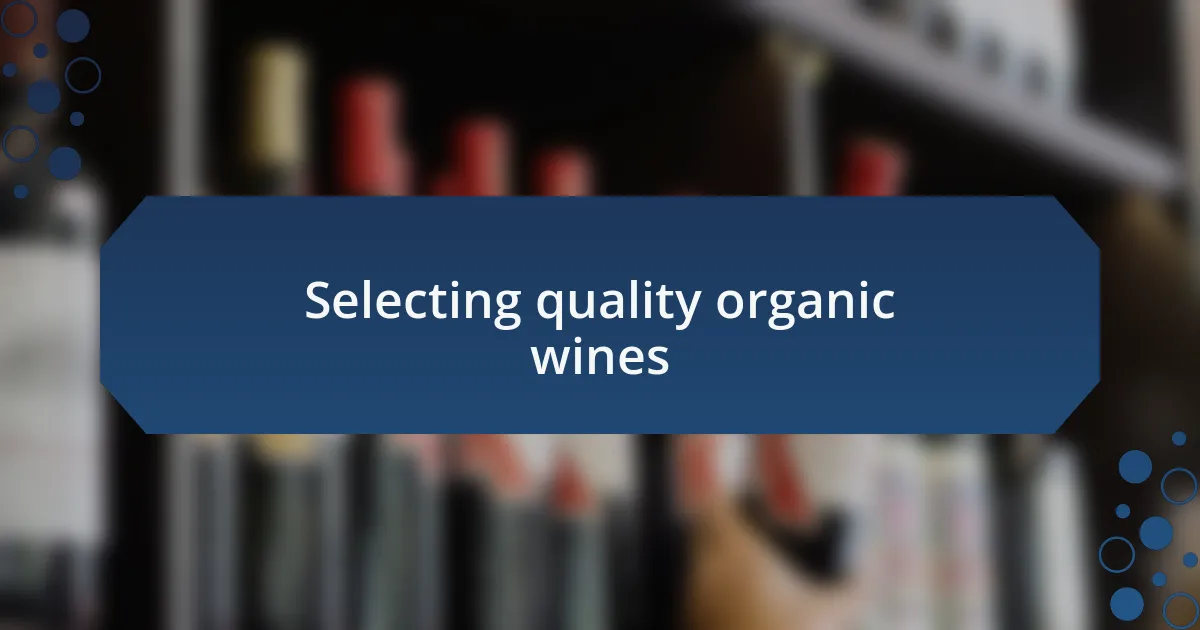
Selecting quality organic wines
Selecting quality organic wines starts with examining the label. I often look for certifications from reputable organic organizations. These seals give me confidence that the wine is made sustainably, with minimal intervention. Have you ever wondered why organic practices matter? They contribute to a healthier planet and often result in better-tasting wines.
Next, I pay close attention to the grape variety and the region. Each wine reflects its terroir—the unique environment where the grapes are grown. I remember trying a Syrah from a hillside vineyard that was vibrant and bold, carrying whispers of the rocky soil. When I ask friends about their favorites, it’s fascinating how a specific region can evoke such passionate opinions and memories.
Lastly, don’t overlook the importance of tasting notes and reviews. I find that reading about other people’s experiences helps narrow down what I might enjoy. It’s delightful to stumble upon a gem that resonates with my palate, like that time I discovered an organic rosé that tasted like the essence of a summer garden. Wouldn’t you agree that selecting wine also involves a bit of adventure?
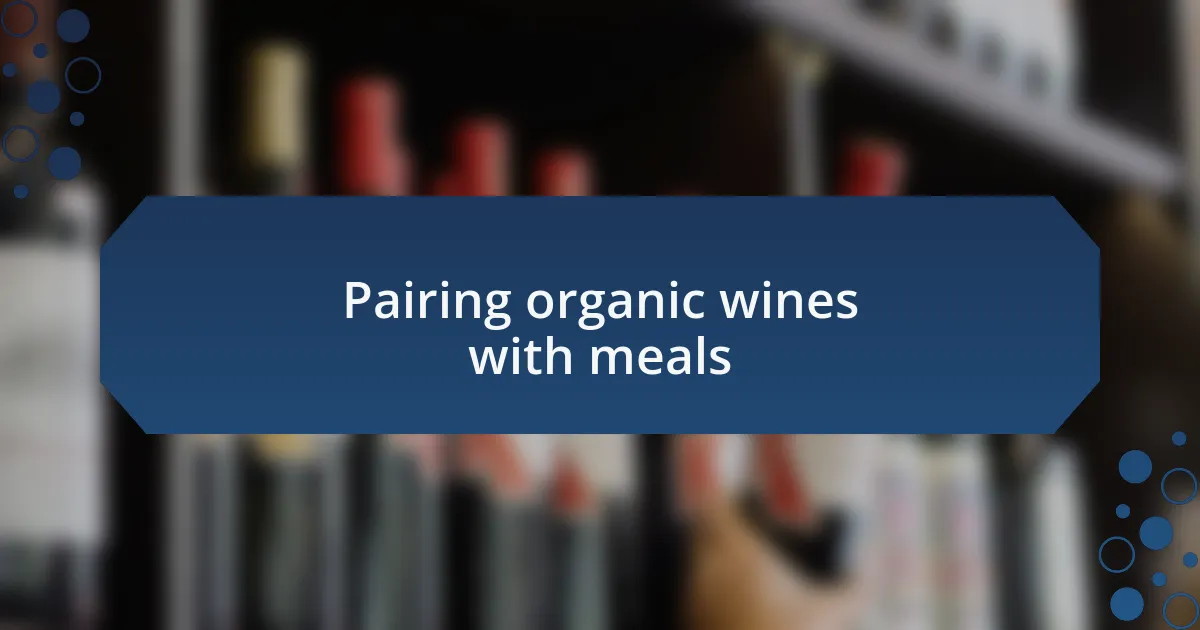
Pairing organic wines with meals
Pairing organic wines with meals is an art that enhances both the food and the wine experience. I remember a delightful evening when I paired a crisp organic Sauvignon Blanc with a light seafood pasta. The refreshing acidity of the wine complemented the dish perfectly, making each bite burst with flavor. Have you experienced that harmonious blend of tastes that lingers long after the meal?
When I think about red wines, I often gravitate towards a rich organic Merlot for hearty dishes like roasted lamb. The smooth tannins and fruity undertones create a beautiful balance with the savory meat. It’s astonishing how the right wine can elevate a simple dinner into a memorable feast, don’t you think?
Sometimes, I enjoy experimenting with unexpected pairings. A recent discovery was matching an organic Cabernet Franc with a spicy Asian stir-fry. The bold flavors of the wine cut through the heat of the dish, providing a delightful contrast that surprised my palate. These moments remind me why mindful wine consumption is such a rewarding journey.
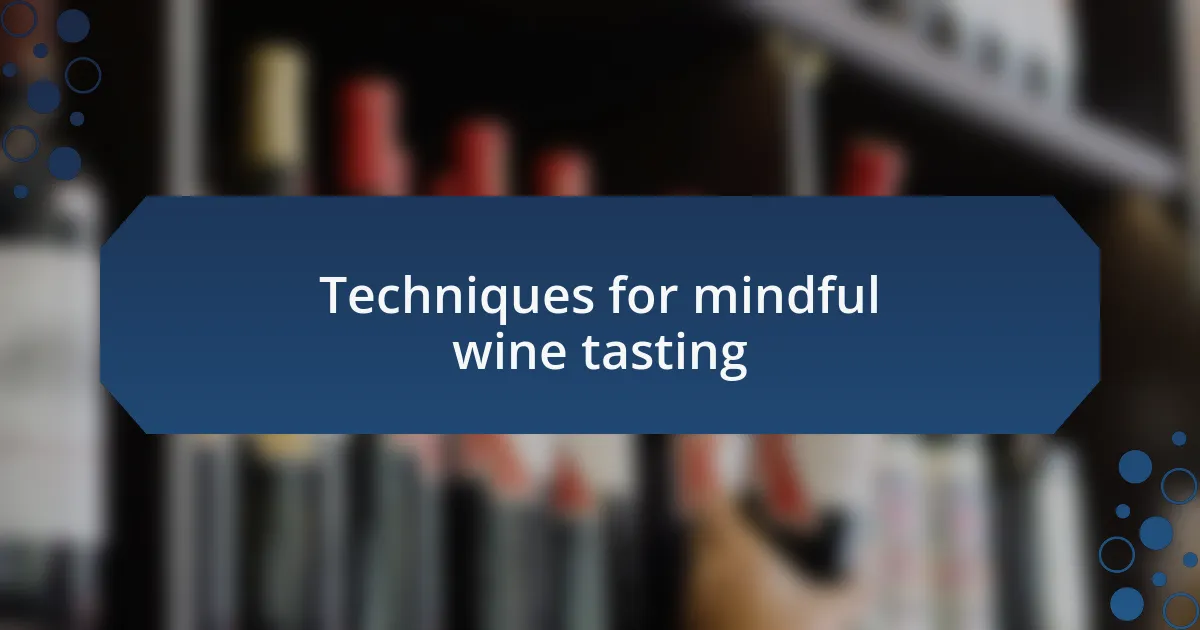
Techniques for mindful wine tasting
When it comes to mindful wine tasting, I always start by taking a moment to really observe the wine. Holding the glass up to the light, I appreciate its color and clarity—this simple act deepens my connection to the wine. Have you ever noticed how a wine’s hue can hint at its flavor profile?
Next, I like to inhale the aromas. I swirl the wine gently, allowing scents to escape and mingle in the air. It’s fascinating how different layers of fruit, earth, or spice emerge. One time, while savoring an organic Chardonnay, I was hit by a wave of buttery notes that reminded me of cooking with my grandmother. That nostalgic aroma instantly transported me back to her kitchen.
Finally, the taste experience calls for attentiveness. I take a small sip and let it linger, paying attention to the flavors unfolding on my palate. Recently, I savored an organic Pinot Noir, and the way its cherry notes danced alongside earthy undertones was simply mesmerizing. Can you sense how much joy comes from truly focusing on each sip? It transforms wine tasting into a mindful moment of discovery, allowing me to appreciate the artistry behind organic production.

Personal tips for enjoying wine
One of my favorite tips for enjoying wine is to pair it with food that complements its qualities. I remember a particularly memorable evening when I paired a robust organic Cabernet Sauvignon with a hearty mushroom risotto. The combination was incredible! Has a wine ever surprised you by elevating a simple meal into an extraordinary experience?
Another practice I cherish is the environment in which I savor my wine. I’ve found that setting the right mood—whether it’s by lighting some candles or playing soft music—can elevate the enjoyment. I once enjoyed a glass of organic Merlot on my porch under a starlit sky, and the tranquil atmosphere made that wine taste richer and fuller. Doesn’t the setting often enhance the flavors we experience?
Lastly, don’t forget to pace yourself and savor those moments. I like to set aside time to truly enjoy my glass rather than rushing through it. One evening, I took my time with an organic Riesling, letting each sip breathe and reveal new notes. It’s amazing how patience can transform the experience; have you ever felt the difference when you really slow down and immerse yourself in each taste?